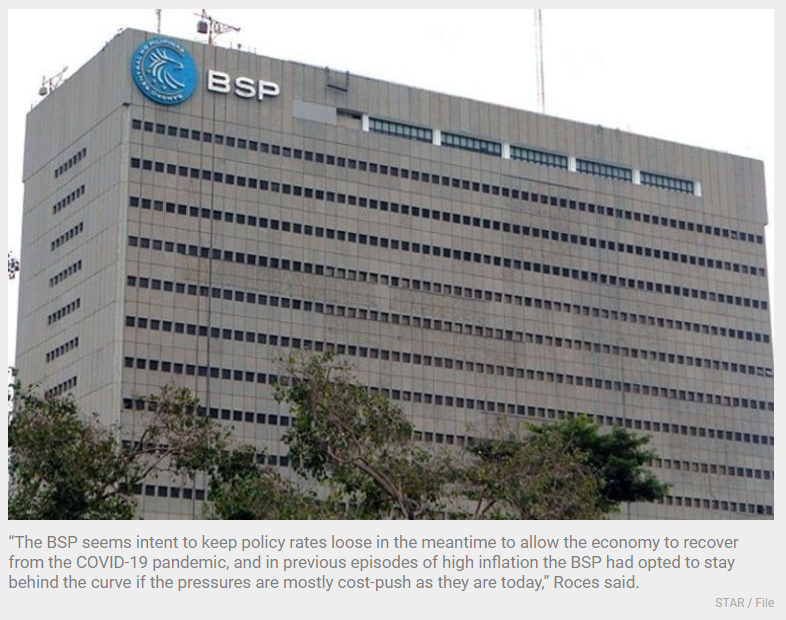Philippines: Economists see BSP keeping interest rates
MANILA, Philippines — Economists see the Bangko Sentral ng Pilipinas (BSP) maintaining a pro-growth stance by keeping interest rates at record lows despite the fact that rising oil and commodity prices are putting monetary authorities in a tight spot.
Security Bank chief economist Robert Dan Roces said the central bank’s Monetary Board will likely put rates on hold on March 24, but should give stronger guidance on policy.
Roces cited the “likelihood of an earlier-than-second half policy action given that the window for monetary policy action may be narrowing with the current circumstances.”
“The BSP seems intent to keep policy rates loose in the meantime to allow the economy to recover from the COVID-19 pandemic, and in previous episodes of high inflation the BSP had opted to stay behind the curve if the pressures are mostly cost-push as they are today,” Roces said.
He said the current cost-push levers are much different than in the recent past due to a global commodities contagion.
“Clearly the key risk is the possibility that world commodity prices stay elevated for a prolonged period as a function of the Russia-Ukraine conflict, pressuring inflationary tendencies, and thus a pre-emptive hike may prove to be more and more prudent,” Roces said.
Ruben Carlo Asuncion, chief economist at Union Bank of the Philippines, said there would be no surprises from the BSP at this point.
“We see the Monetary Board keeping key interest rates where they currently are,” Asuncion said.
ING Bank Manila senior economist Nicholas Mapa echoed Asuncion’s statement as BSP Governor Benjamin Diokno has signaled that monetary authorities would keep a patient hand in the first half of the year.
“However, with price pressures rising, BSP may need to signal some form of reversal lest it increase the risk of losing its grip on inflation expectations and falling behind the curve,” Mapa said.
The BSP has maintained key policy rates at record lows for more than a year after aggressively slashing rates by 200 basis points in 2020 as part of its COVID-19 response measures. It last tweaked the rates with a surprise 25 bps cut in November 2020, which brought the benchmark rate at an all-time low of two percent.
ANZ Research said the Philippine central bank is expected to keep its policy rate unchanged at two percent at its upcoming monetary policy meeting on Thursday.
Rising commodity prices and their implications for growth and inflation mix have put the BSP in a tight spot, ANZ Research said.
“Overall, it will likely maintain a pro-growth stance, emphasizing that fiscal interventions plays a critical role in alleviating the current bout of inflation. It also remains to be seen if the central bank will make a significant revision to its baseline inflation forecasts for 2022 and 2023,” ANZ said.
In its Feb. 17 meeting, the BSP Monetary Board raised its inflation forecasts to 3.7 instead of 3.4 percent for this year and 3.3 instead of 3.2 percent for next year. However, global oil prices and commodity prices soared due to Russia’s invasion of Ukraine.
Michael Ricafort, chief economist at Rizal Commercial Banking Corp., said the decision of the US Federal Reserve to kick off a series of interest rate hikes with a 25 bps increase last year as well as potential sources of second-round inflation effects would be a major factor in the decision of the BSP.
“Thus, it is a tough and delicate balancing act in managing the monetary policy, going forward, to prevent inflation from spiraling further, while at the same time, helping sustain the fragile economic recovery prospects still reeling from the adverse effects of the pandemic that could be jeopardized by any premature tightening of monetary policy that may not be necessarily effective in curbing supply-side inflationary pressures,” Ricafort said.
Ricafort said some supply-side inflationary factors are more effectively addressed by non-monetary measures.
Source: https://www.philstar.com/business/2022/03/21/2168673/economists-see-bsp-keeping-interest-rates


 English
English




